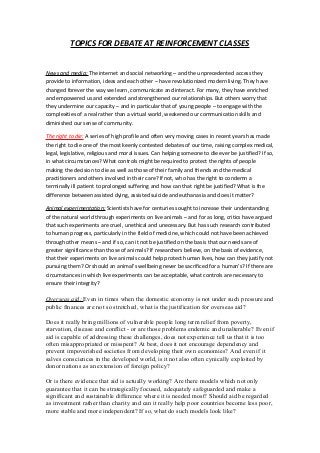
Topics for debate at reinforcement classes
- 1. TOPICS FOR DEBATE AT REINFORCEMENT CLASSES News and media: The internet and social networking – and the unprecedented access they provide to information, ideas and each other – have revolutionized modern living. They have changed forever the way we learn, communicate and interact. For many, they have enriched and empowered us and extended and strengthened our relationships. But others worry that they undermine our capacity – and in particular that of young people – to engage with the complexities of a real rather than a virtual world, weakened our communication skills and diminished our sense of community. The right to die: A series of high profile and often very moving cases in recent years has made the right to die one of the most keenly contested debates of our time, raising complex medical, legal, legislative, religious and moral issues. Can helping someone to die ever be justified? If so, in what circumstances? What controls might be required to protect the rights of people making the decision to die as well as those of their family and friends and the medical practitioners and others involved in their care? If not, who has the right to condemn a terminally ill patient to prolonged suffering and how can that right be justified? What is the difference between assisted dying, assisted suicide and euthanasia and does it matter? Animal experimentation: Scientists have for centuries sought to increase their understanding of the natural world through experiments on live animals – and for as long, critics have argued that such experiments are cruel, unethical and unecessary. But has such research contributed to human progress, particularly in the field of medicine, which could not have been achieved through other means – and if so, can it not be justified on the basis that our needs are of greater significance than those of animals? If researchers believe, on the basis of evidence, that their experiments on live animals could help protect human lives, how can they justify not pursuing them? Or should an animal’s wellbeing never be sacrificed for a human’s? If there are circumstances in which live experiments can be acceptable, what controls are necessary to ensure their integrity? Overseas aid: Even in times when the domestic economy is not under such pressure and public finances are not so stretched, what is the justification for overseas aid? Does it really bring millions of vulnerable people long term relief from poverty, starvation, disease and conflict - or are those problems endemic and unalterable? Even if aid is capable of addressing these challenges, does not experience tell us that it is too often misappropriated or misspent? At best, does it not encourage dependency and prevent impoverished societies from developing their own economies? And even if it salves consciences in the developed world, is it not also often cynically exploited by donor nations as an extension of foreign policy? Or is there evidence that aid is actually working? Are there models which not only guarantee that it can be strategically focused, adequately safeguarded and make a significant and sustainable difference where it is needed most? Should aid be regarded as investment rather than charity and can it really help poor countries become less poor, more stable and more independent? If so, what do such models look like?
- 2. Legalising the drugs trade: For many legalising the trade in drugs would be unthinkable. But among those who have first-hand experience of combating drug misuse, there is a growing number who believe that legalisation not only offers the best means of taking organised crime out of the supply chain but would also save billions of pounds in policing costs. Other experts disagree, arguing that more accessible drugs will increase addiction, that the savings are overstated and that the drug gangs will simply undercut legal supplies in order to retain their grip on trafficking. To what extent might legalising drugs reduce both organised and 'petty' crime; how would it save resources, including public money, and could they be better deployed in reducing drug abuse and its consequences; or, by destigmatising drugs and making them more readily available and affordable, would legalisation simply cause an explosion in dependency and its attending problems, displace criminal activities and/or create new outlets for criminals? How practical is the proposition: could the UK act unilaterally or would the whole world have to follow suit for legalisation to work? Who would gain and who would lose? CONVERSATION TOPICS: Discuss with your partners about the following topics 1. Politicians should receive high salaries 2. The Internet is a reliable source of information 3. Newspapers should always be impartial 4. Access to information is a basic human right 5. Rich people should pay more taxes 6. War is always wrong 7. Education should be free for everyone